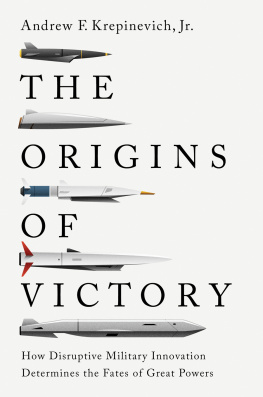THE ORIGINS OF VICTORY

Copyright 2023 by Andrew F. Krepinevich, Jr.
All rights reserved.
This book may not be reproduced, in whole or in part, including illustrations, in any form (beyond that copying permitted by Sections 107 and 108 of the U.S. Copyright Law and except by reviewers for the public press), without written permission from the publishers.
Yale University Press books may be purchased in quantity for educational, business, or promotional use. For information, please e-mail sales.press@yale.edu (U.S. office) or sales@yaleup.co.uk (U.K. office).
Set in Janson type by IDS Infotech Ltd.
Printed in the United States of America.
ISBN 978-0-300-23409-1 (hardcover : alk. paper)
Library of Congress Control Number: 2022934808
A catalogue record for this book is available from the British Library.
This paper meets the requirements of ANSI/NISO Z39.48-1992 (Permanence of Paper).
10 9 8 7 6 5 4 3 2 1
For Julia
My One and Only
With regard to estimating military power there seem to be only problems and very few, well-accepted adequate methods of making such estimates. There are conceptual problems in defining appropriate measures of military power, and many practical problems in carrying out even those partial formulations that seem appropriate. Indeed there are so many problems and difficulties that I can touch on only a few of them.
ANDREW W. MARSHALL
Contents
Acknowledgments
T HIS BOOK IS THE product of many years of research and reflection, benefiting along the way from the inspiration, mentorship, and support of many colleagues. They are too numerous to mention, so I must limit specific acknowledgments to those who had the greatest direct bearing on this book. Whatever shortcomings this work may contain, they would have been far greater had it not been for the kindness and support of many colleagues, friends, and my family.
My work in the security studies field has benefited enormously from having the privilege of serving a full career in the worlds finest army. The experience of working with men and women in uniform, from all services and in all ranks, provided me with an understanding of military organizations. It also gave me a deep admiration and appreciation for those service members who chose to endure hardship and family separation while declaring their willingness, if need be, to make the ultimate sacrifice to defend their fellow citizens security and freedom.
I was blessed to have been assigned for four years during my military career to the Social Sciences Department at West Point. My service there set the foundation for all that was to follow in my work in the field of security studies. Under the inspired leadership of Brigadier General Lee Donne Olvey, faculty members were told to be kind to one another and that any surprises we might have to share with him would not improve with age. He assumed, correctly, that the officers he recruited would strive for excellence in every aspect of their duties. While on the faculty, I was most fortunate to have three mentors, Colonels George Osborn and William Taylor and Lieutenant Colonel Tom Johnson, who encouraged me to expand my intellectual horizons while guiding me along the path to completing my dissertation.
As the reader will no doubt infer from this book, Andrew Marshall has been by far my principal intellectual mentor, as well as one of our countrys greatest and most underappreciated strategists and public servants of the postWorld War II era. For more than thirty years, I was the very fortunate beneficiary of his wisdom, kindness, and encouragement. His mark is on all that is of value in this book.
My work for the Office of Net Assessment over the years has also made me the beneficiary of intellectual encounters with many of its alumni, among them Eliot Cohen, Fred Downey, Aaron Friedberg, Karl Hasslinger, Andrew May, James Roche, Stephen Peter Rosen, Paul Selva, and Barry Watts.
This book benefited from the insights, wisdom, and encouragement of my colleagues at the Center for Strategic and Budgetary Assessments, which I founded and where I spent more than twenty years of my professional career. Among those whose great kindness and strength of character were matched only by the power of their intellects and willingness to aid in my intellectual growth are Steve Kosiak, Robert Martinage, John Stillion, Jim Thomas, Jan van Tol, Michael Vickers, Barry Watts, and Robert Work.
This book also benefited greatly from exchanges with colleagues who patiently listened toand often improved onmy ruminations on disruptive innovation, among them Ross Babbage, J. R. Backschies, Jim Baker, Admiral (Retired) John Harvey, Nobukatsu Kanehara, Andrew May, Admiral (Retired) William Moran, Major General (Retired) Rick Olson, and Admiral (Retired) John Richardson. I am especially indebted to Philip Bilden, Christopher Bowie, Michael Scott Brown, Elbridge Colby, Lieutenant General (Retired) David Deptula, Captain (Retired) Karl Hasslinger, Nicholas Lambert, Colonel (Retired) James McDonough, and Robert Stevens for reviewing drafts of the book, in part or in whole, and providing thoughtful and constructive criticism along with much-needed encouragement.
For nearly thirty years, most of my intellectual efforts, including the writing of this book, have been enabled by the generous support provided by the Smith Richardson Foundation. I owe a tremendous debt to its chairman, Peter Richardson, and its board, which in 1993 took a chance on a newly retired army lieutenant colonel who aspired to establish a public policy institute that would apply Andrew Marshalls net assessment methodology to reach a wider audience.
I am especially grateful to the foundations senior vice president and program officer, Dr. Marin Strmecki, who for three decades has been an inexhaustible wellspring of wise counsel, thoughtful criticism, and constant encouragement. His ability to pose the right questionsto identify issues of strategic significance meriting inspectionand to match them with those in the strategic studies community who are most capable of addressing them, is beyond value. Like Andrew Marshall, he is one of our countrys hidden treasures.
Thanks are also owed to my agent, Eric Lupfer, who patiently took my idea for a book and worked diligently with me to shape and reshape the proposal until it was ready to be submitted to publishers. Eric then found a perfect match for the project in Yale University Press. This is my third book with Eric, a partnership I have come to cherish.
Special thanks are also in order for my editors at Yale. Joseph Calamia and, following his departure, Jaya Chatterjee and Eva Skewes have provided just the right amount of friendly prodding and encouragement throughout a three-year collaboration. My gratitude also extends to Phillip King and Andrew Katz, whose editing greatly enhanced the manuscript. The books index was superbly crafted by Alexa Selph, who imposed organization on a wide range of topics. For that I am very much in her debt.
My work on this book also benefited greatly from the efforts of Katherine Dougherty and Michael Krepinevich, who typed and retyped versions of this manuscript more times than they would like to remember, with Michael also providing fact-checking and editorial support.
Progress in endeavors such as this book make considerable demands on the home front. In this regard, I have been blessed by a supportive family. My three children, Jennifer, Andrew, and Michael; Andrews wife, Nikki; and our grandchildren, Katherine, Sean, Alexandra, Meaghan, and Casey, have been a constant source of joy, encouragement, and support, while displaying remarkable patience. Indeed, during the past three years, the grandkids, upon their arrival at our home, no longer ask, Wheres Grandpa? They just come straight to my office.
Next page






